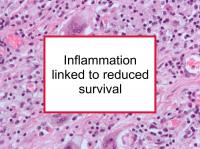Systemic inflammation has been shown to increase breast cancer risk, promote breast cancer progression, and reduce survival. Inflammation is a persistent state that involves the chronic activation of the immune system. This results in an increase in C-reactive protein (CRP), a compound produced by the liver, among other markers of inflammation.
CRP can be measured using a simple blood test. Inflammation has been shown to be important to the growth of cancer stem cells. Breast cancer growth, invasion and metastasis all are promoted by inflammation. Breast cancer patients tend to have high levels of markers of inflammation at diagnosis compared to the general population. Now a new study has reported that high levels of CRP are associated with reduced survival in breast cancer patients.
Latest research finds elevated CRP is associated with poorer survival
The study referenced at the beginning of this news story was designed to investigate the prognostic implications of CRP level among breast cancer survivors. The study included 2,919 early stage breast cancer survivors in the Women's Healthy Eating and Living Study. Blood was drawn and CRP was determined two years after diagnosis and the women were followed for approximately five more years. Outcomes were verified by oncologists from medical records and using death certificates.
High CRP concentrations were found to be associated with increased death from any cause, breast cancer-specific death, and new breast cancer events (local relapse or progression to stage IV). Results were adjusted for sociodemographic and cancer characteristics. Analysis of the results led the authors to conclude that the association between CRP and breast cancer events/survival is not linear; there appears to be a threshold effect. Acute inflammation (defined as CRP levels of at least 10.0 mg/L) had a fairly dramatic effect on survival compared to low inflammation (CRP under 1.0 mg/L).
The five-year survival was 74% for high levels of CRP compared to 90% for low CRP, disease-free survival was 74% for high levels compared to 87% for low CRP, and breast cancer-specific death was 20% compared to 11% during the study period. Associations were similar for breast cancer-specific mortality and any additional breast cancer-related event.
The authors conclude that acute inflammation may be an important independent biomarker for long-term prognosis in breast cancer survivors. Prognosis might be improved by interventions designed to decrease circulating CRP in breast cancer survivors with high levels.
Please see our article on inflammation for more information.
